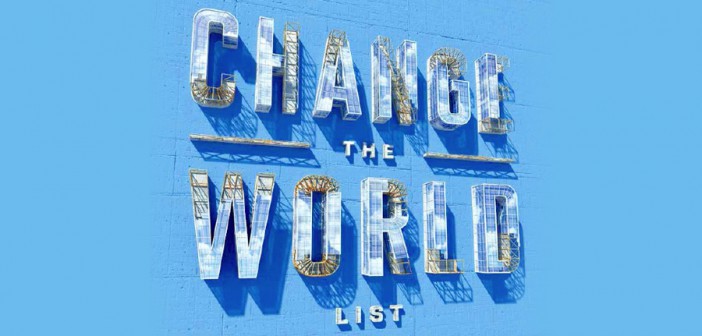Fortune Favors the Bold Companies Trying To Change the World
Fortune magazine came up with the original, now-iconic way of ranking stature of American corporations—the Fortune 500 list of annual revenues—so it may be a bit surprising that the venerable business publication would try to come up with a fresh way of evaluating the worth of businesses.
The Time Inc. title’s just-published inaugural “Change the World” list of companies is doing exactly that. Some familiar and predictable names (Google, Toyota, Facebook), some relatively unfamiliar (Enel, Jain Irrigation Systems), and some perhaps-surprising companies (Walmart) populate the top of the ranking of 51 companies that “have made a sizable impact on major global social or environmental problems as part of their competitive strategy.”
Despite a tagline of “Put your money where your soul is,” Fortune further explained, “This list is not meant to be a ranking of the overall ‘goodness’ of companies or of their ‘social responsibility.’” But certainly many will interpret it as such, and that is a key to understanding how Fortune ended up with this list.
Not only does it present a very strong environmental cast, but its methodology favors a definition of “social” advancement that doesn’t include corporate acts of coming up with great and innovative products and services or of supplying them to the world inexpensively. As it explains:
In our evaluation, we considered four criteria: the degree ofbusiness innovation involved, the measurable impact at scale on an important social challenge, the contribution of the shared-value activities to the company’s profitability and competitive advantage, and the significance of the shared value effort to the overall business. A team of journalists from Fortune then further vetted each of the nominees and reported on their impact. The final list of 51 was selected and ranked by the editors of Fortune based on the magazine’s own reporting and by the analysis provided.
Fortune assistant managing editor Leigh Gallagher illluminated the criteria on CBS This Morning:
“We noticed a big shift in terms of capitalism, which has been under attack, to conscious capitalism, or caring capitalism. Companies are starting to forge ahead and really try to solve the world’ problems. This isn’t philanthropy. This is companies doing the things as part of their profit-making ventures. We’re not saying they’re 100 percent gold, but they’re having a measurable effect on making the world better.”
Thus, in its analysis along with nonprofit social-impact consulting firm FSG, Fortune tabbed as No. 1 Vodafone and Safaricom together, for the mobile-money platform they launched in 2007 that has helped transform developing regional economies around the world.
Google comes in at No. 2 for, as Gallagher put it, “unlock[ing]information for the whole world … and also [co-founder] Larry Page is trying to help humans live longer and deliver Wi-Fi to the world with balloons.”
Equally not a shocker is Toyota at No. 3, largely for its launch of the Prius hybrid several years ago that comprised the world’s first major electrification of auto mobility. Fortune decided to give Toyota a pass for recent violations such as the years of foot dragging involved in its massive safety recall in the US. “Look at the measurable ways these companies are doing good,” Gallagher said.
Similarly, foodie favorite Whole Foods Markets makes the list at No. 30, despite recent allegations of fraudulent labeling of package sizes. “Whole Foods has really raised the standard for every grocery store,” Gallagher explained. “There’s the joke about ‘Whole Paycheck,’ but they started the conversation about where your food really comes from … and now they’re starting a chain called 365 with lower prices.”
In her comments on CBS about Toyota, Gallagher also shed more light on the human analysis that determined the final list. “For a while,” she said, Prius “was the hot car that everyone drove in Hollywood.” So does that mean celebrity endorsement of a company or a brand was a significant factor in putting together the list?
More insights into the thinking of Fortune editors and their research partners at FSG are shed by the fact that, while there’s a brewer at No. 19, SABMiller, there is not one oil company, despite producing enough oil to reduce America’s need for imports and for tilting the balance in the global oil market so that prices are lower for US motorists.
With its focus on sustainability and corporate citizenship, there also are no manufacturers on this year’s list. Instead, the focus is on creating shared value and measurable impacts on a global scale, and how companies are striving to change the world (not America) for the better. One article in the package, for example, contrasts how Coca-Cola and PepsiCo are approaching water conservation.
While recognizing CVS for its big move to boycott tobacco, Fortune also retail Walmart at No. 4 even though some would question such a choice. The retailer made the list for doing “sustainability on a massive scale,” as the magazine put it. (Not mentioned: how Walmart saved the typical American household thousands of dollars in past decades by making the staples of life more affordable.)
A few other surprises: Starbucks only ranked No. 23, and while Elon Musk’s SpaceX is No. 36, Fortune somehow ignored media darling Tesla even though Ford also made the list along with Toyota.
And in perhaps the biggest shocker of all: IKEA and Nike are on the list, but Apple isn’t.


